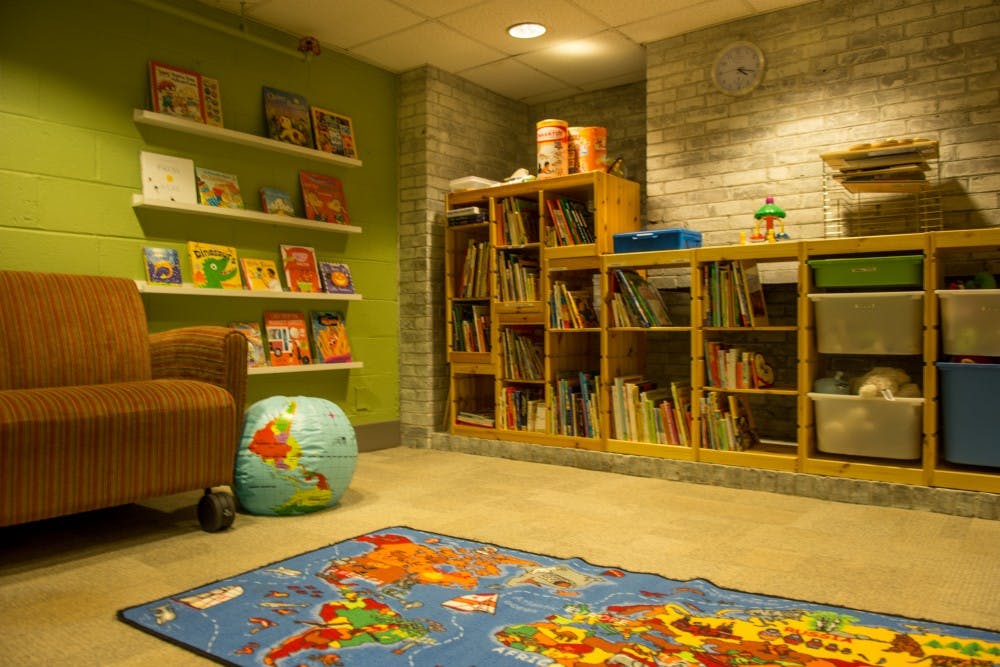
Ph.D. student Will Schmenner said that the University climate ostracizes graduate students with families, which in turn encourages many students not to have children while earning their degree.
Credit: Natalie Kahn , Natalie Kahn, Natalie KahnPenn students have a lot to keep them busy — jobs, research and for about 1,500 of them, children at home.
Associate Director of Penn’s Family Resource Center Jessica Allen Bolker said this statistic is surprisingly high.
Latoria Eason, a Graduate School of Education student, is the mother of a 15-month-old and a three-year-old. However, instead of bringing to them to Philadelphia, she is leaving them at home with her partner during the two semesters it takes to finish her degree.
“It’s more so an emotional drain,” she said. “You go through phases of guilt — feeling guilty for leaving your kids, feeling selfish, even though you know you’re doing it for them.”
History of art Ph.D. student Will Schmenner brought his family to Philadelphia with him. He and his wife have a seven-year-old and and a four-year-old.
He said that the University climate ostracizes graduate students with families, which in turn encourages many students not to have children while earning their degree. For many women, he added, this means delaying pregnancy until their last year of graduate school so that they can hand in their dissertation before having a child.
Schmenner’s wife, Lucia Bay, who recently completed a graduate degree in London, added that there is no easy time to raise a family — doing so while in the workforce would bring its own challenges. However, she was quick to emphasize that it doesn’t get much more difficult than balancing child rearing with the pursuit of a degree.
“There’s this way that having a family in grad school or the academy is always seen as a miraculous thing,” Schmenner said. “People will question whether or not you’re truly committed to your academic path.”
Eason has noticed a similar lack of compassion. Right before her comprehensive exam — the test that determines whether or not she receives her degree — she was informed that her son was having a seizure. However, she was not permitted to go home and postpone the test.
Though Eason took the exam and was notified this week that she passed, she already petitioned her department so that future parents will not have to face the same struggle. With the help of her peers, there now exists a rule that students facing a crisis during their exam can reschedule it.
Schmenner described more progress from the University with regard to accommodations for families, such the establishment of the Family Resource Center. Opened in 2010 as a part-time facility in Houston Hall, the Family Resource Center earned a permanent home on the first floor of the Graduate Student Center in 2014, Bolker explained.
To create a sense of unity among graduate student parents, Bolker described that the center runs upwards of 30 programs per year for both parents and children. She said that the Family Resource Center is not a day care — children must be supervised at all times when playing with the toys or using the reading room — but instead prides itself on the resources it offers.
The Family Resource Center has 500 active members, and its target audience is parents with kids under the age of four. Membership is free and just requires a consent form to receive subsidized child care via Care.com and to become eligible for family grants, among other benefits.
The Family Resource Center offers two lactation rooms as well, a facility Schmenner said Penn was lacking until four years ago. For this reason, he seldom used to bring his wife to campus, an area he called “completely and totally unfriendly” to new mothers.
To this end, Schmenner said that the Family Resource Center is “fighting some of the entrenched cultural practices” and “making space to help the University change.”
As issues such as the lack of University housing for graduate students with families are not readily fixable, he said, he finds hope in the fact that Penn has begun to make changes.
Still, he noted that there is quite a ways to go.
“The way the system works, right now,” he said, “it’s assumed that you just won’t have a kid during graduate school.”
The Daily Pennsylvanian is an independent, student-run newspaper. Please consider making a donation to support the coverage that shapes the University. Your generosity ensures a future of strong journalism at Penn.
Donate




